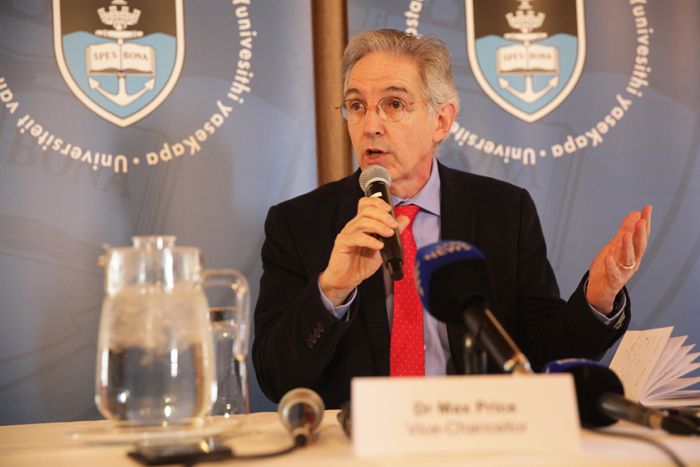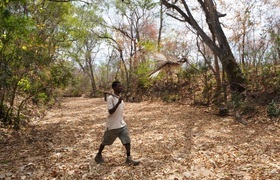'We will have a potential lost generation'
28 September 2016 | Story by Newsroom
UCT needs to reopen on Monday, 3 October. Failing to do so will have disastrous consequences for UCT and the higher education sector as a whole, said Vice-Chancellor Dr Max Price at a press conference on 28 September 2016.
Not returning to class on Monday will make finishing the 2016 academic year nigh impossible.
Students relying on passing this year's final exams in order to take up bursaries, job offers and to write professional qualification exams will be unable to do so, he said.
The irony is that poor students will suffer the most if the academic year cannot be finished, said Price.
Students whose families pay for their studies are more likely to be able to see out a lost semester at home than students who rely on other funding. Poor students may be unable to return to complete their final semester, to step into bursary job contracts or to support their families.
The university will also be unable to accept a new cohort of first-year students if the current group have not finished their year of study.
'We will have a backlog and a potential lost generation,' he warned.
Some 2 400 new health practitioners - 375 from UCT - will also not be able to graduate in time for next year's intake of interns in South Africa's public hospitals. These graduates will be unable to take over from the current cohort of interns in those hospitals.
'There is a serious risk of public health sector collapse,' Price said.
This risk extends to sectors like accounting where students need to write national board exams by a given externally determined date, or lose a year, he said.
Risks for UCT
If students are forced to complete their 2016 curriculum in early 2017, they will not be obliged to pay fees for this first semester. Given that fee income is half of the university's total income for teaching, the absence of fees for three months is a loss of hundreds of millions of rands. How will we pay salaries?
Reputationally, if the 1 000 international students who come to UCT for a semester cannot be assured that they will complete their semester on time to continue their studies at home, they will go elsewhere in the world - it is a very competitive market. We will lose those international student mobility partnerships. Most critical of all, we will lose good academics who are dedicated teachers but want to be able to work in a stable environment, and the quality of higher education, at UCT and in SA, will decline.
This is not to say that there is no justification for the protesting students' cause, said the VC. While he felt that free higher education for all would be a 'regressive, anti-poor policy', Price supports free education for the poor and an affordable higher education programme for middle-income households.
'We believe that part of the frustration being expressed by the national student body is that they don't yet see a plan; they don't yet see a future and in the meantime, there is no system to help fund the missing middle.'
Given that the judicial commission on fees is only due to report in June 2017, and the array of political processes that follow, a national budget providing a new funding model for university fees is unlikely to be in place even by 2019.
But shutting down the university and potentially ruining the higher education sector and young people's careers is not the answer, said Price.
'I have been talking to students. We've tried to get students talking to each other, talking to staff, talking to the SRC, working with student councils, to try to understand the more specific local issues that are getting in the way of returning to work,' he said.
Speaking about the five expelled students, around whom UCT students have based much of their campaign, Price said that he was open to engaging in a restorative justice process.
'We're not interested in making this a life sentence,' he said.
'If certain individuals who are interdicted or expelled continue to declare support for violence as a legitimate form of campus protest, they cannot expect to be allowed back. If they were to participate in some sort of restorative justice process, some sort of reconciliation process, where they acknowledge the limits of acceptable protest and behaviour, it may be possible at some stage in the future for them to come back and continue their careers.'
Price entreated the protesting students: 'Don't sacrifice your futures, the future of the country and the future of higher education, by insisting on immediate answers to complex issues. We need to address those in a parallel process, in a democratic process, in a process that is not won through force or threat, or through infringing the rights of others - but a process that is through negotiation and democratic.'
Story Yusuf Omar and Kate-Lyn Moore. Photo Michael Hammond. Video Saadiq Behardien.
 This work is licensed under a Creative Commons Attribution-NoDerivatives 4.0 International License.
This work is licensed under a Creative Commons Attribution-NoDerivatives 4.0 International License.
Please view the republishing articles page for more information.










